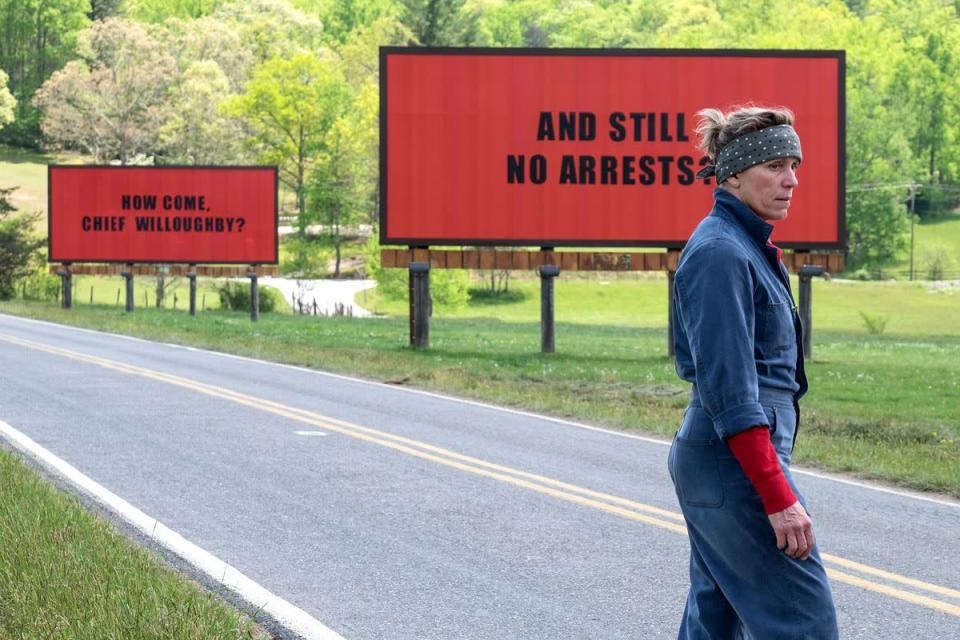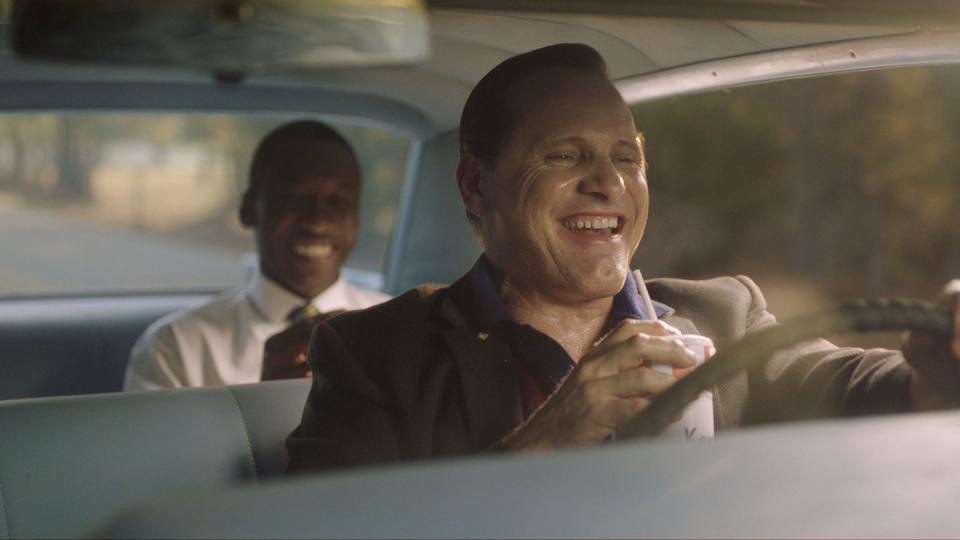At This Year's Oscars, Donald Trump Is Still Everywhere

Cast your mind back to March 2018 – which at the time felt like a gloomy nightmare, but boy was there something worse waiting in the wings – and the winner of best picture at the Academy Awards. It was the second ceremony since Donald Trump had taken office. The Academy was still reeling from the previous year's debacle, in which Hollywood naval gazer La La Land was accidentally announced as the winner, over Barry Jenkins's ode to Black boyhood, Moonlight. If the optics weren't good then, today the symbolism is toe-curling.
The following year, the Oscars villain narrative settled around Three Billboards Outside Ebbing, Missouri, which is either about a mother grieving for her dead daughter and holding the justice system to account, or the redemption of a racist white police officer, depending on which way you look at it. Though Frances McDormand and Sam Rockwell took home shiny statues for their performances, the film didn't take the big prize at the end of the night, losing out to Guillermo del Toro's The Shape of Water.

Only months before, Trump had called the neo-Nazis behind the deadly Unite the Right rally in Charlottesville, Virginia, "very fine people", and refused to condemn white supremacy. Coming amid that cultural turmoil, del Toro's win felt political by virtue of avoiding politics. After all, who can really be upset about a film where a woman falls in love with a fish? Perhaps only the incel fish Reddit boards lit up that year.
In the two years since, there has been no such escaping politics, with best picture winners Green Book and Parasite each becoming a proxy for arguments over the Trump presidency. The problems with Green Book were especially visceral: from the director's Islamophobic tweets, to pianist Don Shirley's family taking issue with his portrayal in the film, to general issues with its white saviour narrative. Anti-Muslim, with little regard for truth and happy to gloss over racism; the arguments against Green Book were essentially arguments against Trump, even if they were complicated by the fact that the film – and the Academy – seemed to believe it was aligned with the movement towards racial justice.

The following year, Parasite served as a riposte to the longstanding tradition of foreign-language films being shut out of the Oscars, with its historic 2020 wins especially pertinent as Trump continued to blame China for the pandemic. "How bad were the Academy Awards this year?” Trump asked a rally in Colorado later that month. "The winner is a movie from South Korea, what the hell was that all about?" Battling that kind of small-minded xenophobia has only become more urgent in the year since, with the pandemic and the Black Lives Matter movement reinforcing the need for a more global and empathetic view of humanity.
Which brings us to the 2021 ceremony, which continues to hobble along. Yes it's been pushed back, no most of the films aren't available in most of the world, and yes the organisers are going to have to embrace Zoom after all. But more complicated than any of that is figuring out what politics the Oscars are supposed to represent right now, if any at all.

This year is the last of the Trump presidency, with the majority of the films competing released while Trump was in office, and all made during his tenure. As such, they can each be seen as grappling with one or more aspects of his time in office. Trump might be gone, but the ghost of him is still everywhere, with themes like the power of protest, economic inequality, sexual assault and racial injustice cropping up again and again.
In Nomadland, Chloe Zhao shines a light on the vanishing middle class of middle America, who have seen their retirement plans swallowed up before their eyes. Though Jessica Bruder, who wrote the book which the screenplay is adapted from, has spoken about how the people she met were not necessarily Trump fans, the movie does show why a generation feels like the world has slipped from underneath them, and where they might look for answers.

Nomadland is the favourite to take home best picture, but the argument that it paints too flattering a picture of work at Amazon is hanging over it as it enters the final furlong. This 'controversy' could play into the hands of Aaron Sorkin's The Trial of the Chicago Seven, the most obviously anti-Trump film, which has got plenty of eye-rolls for its portrayal of a justice system which rewards verbose speeches and stunts from a group of white liberals, and the power of the ballot box trumps direct action, which feels anachronistic considering the success of the Black Lives Matter protests. It's this year's Green Book: a film which allows the Oscars a self-congratulatory pat on the back for speaking truth to power, even though it actually reinforces the status quo.
Then there is Minari, Isaac Lee Chung's fable of an Asian-American family on a farm in Arkansas, which speaks to the idea of the American dream and the invisible people holding it up. As in the film itself, the Oscar story around Minari is about who we see as American and who we do not, with the nominations for its cast correcting a long overdue failure to reward Asian actors. In the wake of a string of horrific hate crimes experienced by the Asian American and Pacific Islander (AAPI) community, many of whom have suffered the consequences of Trump branding Covid-19 "the China virus", Minari winning would be a bold statement about what American families can – and do – look like.

Signs of Trump's effect on popular culture are in all the nominees, like Emerald Fennell's Promising Young Woman – the title of which plays on the way Stanford University rapist Brock Turner was presented in court – a film that rallies against how women's testimony is doubted, as has been the struggle for the many women who have accused Trump of assault. Of all the best picture nominees, Judas and the Black Messiah grapples the most overtly with racial injustice, and yet it's wound up seemingly without a lead and instead with two best supporting actor nominees. It's unlikely to get a look in for the big prize.
Hollywood sees itself as deeply political and in tune with those rallying against societal ills, yet both those on the left and right are aligned on seeing it as out of touch. As one writer pleaded yesterday, when the jury in the George Floyd trial found police officer Derek Chauvin guilty of murder: "Aaron Sorkin stay away from your typewriter".
Aaron Sorkin stay away from your typewriter
— Carrie Wittmer 👻 (@carriesnotscary) April 20, 2021
Since the last Oscars we've seen celebrities reminding us they are just like us as they wait out the pandemic in their many houses, or cobble together a cover of "Imagine" to give the poor folk something to smile about. There is no fish love story to save us from politics this year – although Mank might offer the closest to it in terms of escapism – so it's likely that whatever wins will have the greasy fingerprints of Trump's legacy on it somewhere. After all, this is either the last Oscars of the Trump era, or a one year reprieve until he comes roaring back. Wouldn't that be a twist ending.
Like this article? Sign up to our newsletter to get more delivered straight to your inbox.
Need some positivity right now? Subscribe to Esquire now for a hit of style, fitness, culture and advice from the experts
You Might Also Like


